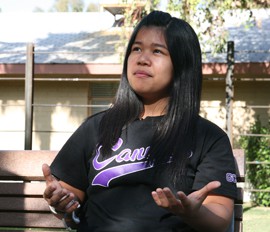- Slug: BC-CNS-Private University,600
- Sidebar: Facts about Grand Canyon University.
- Photos available (thumbnails, captions below)
By ALYSON ZEPEDA
Cronkite News Service
PHOENIX – At Arizona’s public universities, incoming resident students will pay from $8,474 to $9,716 a year in tuition and fees come fall thanks to state funding cuts. That’s an increase of 45 percent to 72 percent since the 2008-2009 school year, depending on the university.
But at Grand Canyon University, a private Christian institution, tuition, while higher at $16,500 a year, isn’t changing and hasn’t since 2009.
For Brian Mueller, the school’s CEO, freezing tuition isn’t so much an attempt to lure students away from state universities as a way to attract high school graduates who would normally leave the state to attend a public or private school. However, Mueller said he can see the possibility that Grand Canyon University will draw some students who might have attended Arizona State University, the University of Arizona and Northern Arizona University.
“Really, we are now competitive, room, board, tuition and fees with state universities, which are heavily tax subsidized,” he said.
With the school’s unique business structure as a publicly traded company and with revenue from 40,000 online students, a virtual student body dwarfing the 3,000 students on campus, there was just no need to raise tuition, he said.
Mueller said that in the end, both groups of students are benefiting from low tuition and the additional revenue is pumped back to investors and into the physical campus.
“Lower class and middle class Americans can go to a private university and do it for about a third of the cost of what it would cost to go to most private universities,” he said.
Jamie Mones, a freshman nursing student from Saudi Arabia, said that Grand Canyon University recruited her and offered her a scholarship to offset some of the costs. If tuition had increased for next year, Mones said she might not have been able to stay at the school.
“Most likely, if I knew it would be difficult for me to find other scholarship that could help me stay here, then yeah, maybe I’d just start looking somewhere else,” she said.
Recently, Grand Canyon and other for-profit universities came under fire for recruitment practices. The school’s parent company, Grand Canyon Education Inc. based in Phoenix, recently paid $5.2 million to settle a lawsuit alleging that the university violated U.S. Department of Education regulations by tying recruiter compensation to the number of students they enroll.
However, Ron Gunderson, an economics professor at Northern Arizona University, said Grand Canyon University may be an example of a narrowing gap between public and private universities. As students attending public institutions are increasingly asked to pick up a greater share of tuition costs, he said, the price difference between private schools and public schools shrinks.
“As a result, I think we might find more students considering … private education as a viable alternative where they couldn’t do that before,” he said.
The closer private and public universities get with regard to cost, Gunderson said, the more likely students will be to pay a little bit more to go to a private institution, and Grand Canyon University is taking advantage of that market.
“It is a good strategy, I think, to try to position yourself as competitively as you can to try to capture a certain segment of the market that might be willing to look at a change during this type of economic environment,” he said.
Looking forward to her second year at Grand Canyon University, Mones said she values the stability of tuition prices, especially in light of the increases at other schools.
“It’s definitely a good thing to know that tuition is staying the way it is,” she said.
^___=
Grand Canyon University:
– Founded as Grand Canyon College in Prescott in 1949
– Relocated to Phoenix in 1951
– Renamed Grand Canyon University in 1989
– 3,000 on-campus students
– 40,000 online students
– $16,500 yearly on-campus tuition
– $450 per credit for undergraduate online courses
^___=

Jamie Mones, a freshman nursing student from Saudi Arabia, said that if Grand Canyon University had raised tuition for next year it might have been difficult for her to continue to attend the school. (Cronkite News Service Photo by Alyson Zepeda)

By keeping tuition low, Brian Mueller, Grand Canyon University’s CEO, said he hopes to tap into the population of students who would normally leave the state to attend a public or private university. (Cronkite News Service Photo by Alyson Zepeda)